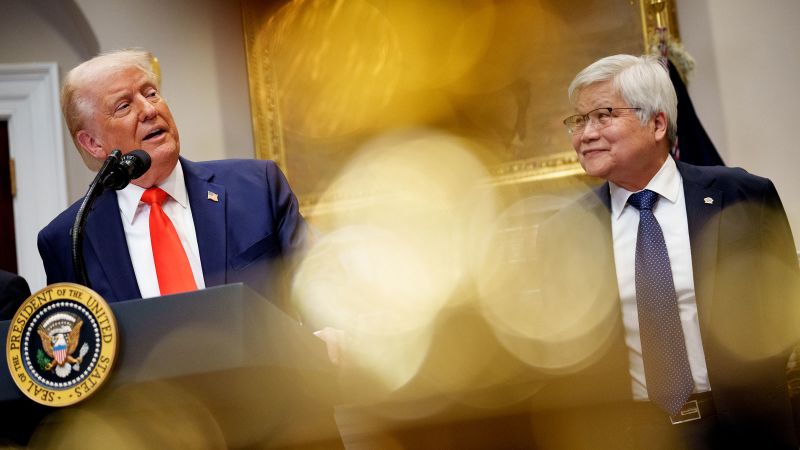TSMC US investment: Fear and resignation after ‘world’s most powerful company’ pays Trump $100 bi...

Taiwan's Tech Titan Under Pressure: TSMC's US Expansion Sparks Fears and Debate
A Controversial Ceremony and its Repercussions
A celebratory unveiling at the White House, a $100 billion investment from Taiwan Semiconductor Manufacturing Company (TSMC) – hailed by President Trump as a victory. Yet, thousands of miles away in Taiwan, anxiety rippled through the nation. The unexpected announcement reignited a simmering fear: the potential loss of their prized semiconductor industry to the United States.
Former Taiwanese President Ma Ying-jeou didn't mince words, accusing the ruling party of essentially "selling" TSMC to Trump as a "protection fee," labeling the situation a national security crisis.
The current president, Lai Ching-te, sought to quell concerns, assuring the public that TSMC's US expansion wouldn't compromise its commitment to its homeland.
The "Silicon Shield" and Geopolitical Tensions
TSMC holds a dominant position, producing over 90% of the world's advanced microchips, powering everything from smartphones to cutting-edge weaponry. This dominance has fostered a belief in Taiwan that their technological prowess serves as a "silicon shield" - a deterrent to a potential invasion from China.
China, however, claims Taiwan as its own and has ramped up military activity around the island, adding fuel to the fire of these anxieties.
While Taiwan relies on US support, Trump's rhetoric has created uncertainty. His accusations of Taiwan "stealing" the US semiconductor industry and demands for "protection" money have left many Taiwanese feeling uneasy.
Parallels to Ukraine and Growing Concerns
The phrase "Ukraine today, Taiwan tomorrow" has become increasingly resonant in Taiwan, especially following recent events surrounding US aid to Ukraine. Some Taiwanese citizens see unsettling similarities between their situation and Ukraine’s, both democracies facing powerful, expansionist neighbors.
Tammy Chao, a retiree, voiced her concerns to CNN, likening Trump's approach to Taiwan to his dealings with Ukraine, fearing that Taiwan might become a bargaining chip in international politics. "TSMC was the best card," she lamented.
Others hold a less pessimistic view. Fred Lin, a finance professional, believes TSMC acted strategically. “Who doesn’t pay protection fees to the US?” he asked pragmatically, acknowledging the realities of international politics.
Beyond Semiconductors: A Complex Security Landscape
Experts, however, caution against drawing simple comparisons between Ukraine and Taiwan. They emphasize the complex interplay of factors influencing Taiwan's security, including China's broader geopolitical ambitions and the island's strategic significance.
Min-yen Chiang, a fellow at a Taipei think tank, argues that China's actions are driven by core interests that extend beyond Taiwan's role in chip production, pointing to historical instances where Taiwan's security was paramount even before the semiconductor industry existed.
TSMC's Justification and Future Implications
According to TSMC, the US expansion stems from "strong demand" from American clients like Apple and Nvidia seeking to minimize supply chain risks. TSMC CEO CC Wei assured that the core development of cutting-edge chipmaking technology would remain firmly rooted in Taiwan.
Analysts have commended TSMC for its strategic maneuvering. Ming-Chi Kuo, an analyst at TF International Securities, lauded TSMC as "the most successful non-US company in negotiations with the Trump administration," noting the flexibility built into the investment agreement.
A Ripple Effect Across the Tech World
TSMC's massive investment has set a precedent, with Trump claiming more are on the horizon. His tactic of using tariffs as leverage, rather than Biden’s subsidy approach, appears to be yielding results. Companies like Apple and Oracle have already announced substantial US investments, and pressure is mounting on other tech giants like Samsung and Intel.
Chang-Tai Hsieh, an economist at the University of Chicago, predicts that companies will be compelled to appease Trump, but cautions, "Once you agree to blackmail, then there’s no end of it.”